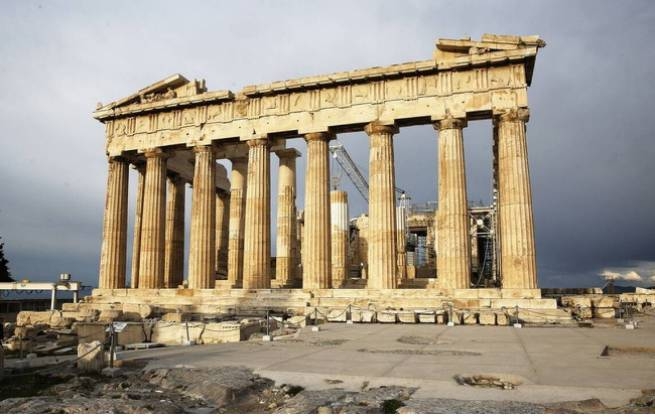The Italian writer Andrea Marcologo, in her article in Liberation, took a clear stance towards Greece, speaking of the return of three marble fragments from the Parthenon temple by the Vatican.
In her article published on the occasion of the Paris Book Festival in the French newspaper Liberation, she writes:
“Paris, Copenhagen, Würzburg, Karlsruhe and especially London are the cities where even today people sigh over fragments of the Parthenon stolen from Greece.”
The writer refers to a recent Vatican decision to return three marble fragments to Greece, as well as to the request of Greece to return the marble sculptures of the Parthenon. Markologo recalls Lord Byron’s “prophetic” poem “The Curse of Athena” and notes that some countries finally decided to react.
For example, Italy, which returned part of the eastern zoophore to the Acropolis Museum, which was kept in the Archaeological Museum of Palermo until 2022, where, under unclear circumstances, it ended up in the early 19th century. She emphasizes that where politics does not have—or does not want to have—legal means (because the works of art of the state are inalienable and in no way transferable), there is religion:
“Pope Francis has said he wants to right an injustice that has gone on for over 200 years, a stance that has been welcomed by Lina Mendoni, Greek Minister of Culture.”
Rev. Papamikrulis, representing the Archdiocese of Athens, said the gesture partially heals some past wounds:
“When Christians work together, they can bring results and together come up with practical solutions to long-term and historically unresolved problems.”
The author of the article points out writes CNN Greece that the return of the three fragments to Greece was done in the context of a donation from the Catholic Church to the Orthodox Church, and not as a return from state to state. The pope offered the sculptures to Archbishop Hieronymus II, who in turn decided to donate them to the Acropolis Museum, she notes.
Marcologo also mentions that the metope and a fragment of the Parthenon frieze are still on display in the Louvre, brought to France by Count Choiseul-Gouffier, ambassador of the Ottoman Grand Porte during the Napoleonic Empire. She then refers to Lord Elgin’s story and how he removed the marble, emphasizing that in fifteen years the Parthenon, which has a history of 2,500 years, has suffered and fallen apart like never before.
Calling it terrible to wait and, even worse, to stop waiting, she emphasizes that the Greeks continue to hope for the restoration of marbles. And adds:
“I wonder if this is not a geographical curse, fate, the whole South should be humiliated by a northerner, whoever he may be. The reasons why they oppose the return of marble to Greece in the last two centuries are exactly the same as those that are present today in the debate about the restoration of African works of art. We have done them a service, the Greeks should thank us – this has long been the position of England and the West in relation to their reproaches, accompanied by surprise at this lack of gratitude. Even today England refuses to consider returning her antiquities to Greece.”
Andrea Marcologo concludes:
“After all, all of Europe, we all stole something from Greece: whether it was her ideas, from which we forged our Western roots, or the marbles of the Parthenon, it does not matter. Someday we will have to learn to pay our debt to Athens.”







More Stories
Today the world remembers the accident at the Chernobyl nuclear power plant
A trial has begun in the case of a fatal accident involving Dora Bakoyanni's car.
Poll: which European countries are ready to defend their homeland to the last